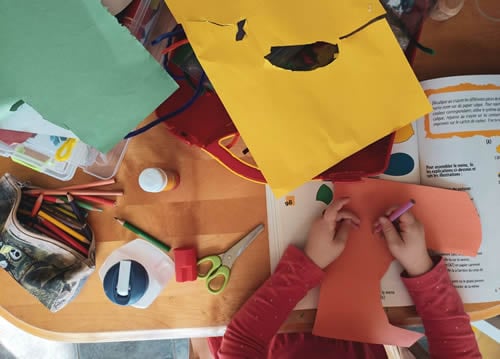By Specialist SEN Tutor – Gillian
Families with children with special needs have put extra demand on teachers to be all-encompassing, as well as their families who now find they have to juggle their already demanding work and lives with their children stuck at home during another COVID-19 lockdown.
Parents wonder what on earth the school is giving their children to do; they see their children can’t manage tasks without being by their side. We wonder, what is the school teaching? Who is actually responsible? And what can we all do now to continue your child’s education and minimise the disruption?
The ups and downs of technology and online learning
Some schools have embraced technology; the students love it anyway.
Unfortunately, others haven’t been organised to set up the infrastructure needed for staff to deliver online, hiding behind the school head, board or Local Authority.
Independent schools have to work a lot harder as they have a financial interest – they need to keep educating your children as you pay their salaries! However, many may produce lots of work for your child to do, so you always have things to keep them busy! (Forgetting that the parent often has a job, and a teacher would normally scaffold tasks, and teach the children what they need to do. So, it is often left to the parent or tutor to work out what to do best).
Most of us generally acknowledge that online lessons are not ideal, especially with children that find it hard to focus, sit still or work independently. Face-to-face interaction for children with their teachers, whether it is simply 10-15 minutes daily form time, tutor time or classes to bring students together, brief them on daily tasks would be invaluable, as well as live lessons in real-time, but it’s not for everyone.
No matter how hard schools try to produce and deliver lessons for children working at home, often the school doesn’t manage to adequately differentiate for the children with additional or varied learning needs or SEN, and it’s even harder for families.
I have put together some tips for teachers and parents to ‘Keep sane and carry on!’ These will be shared in two parts; read on for tips 1 to 9 and the rest of the tips will be coming soon in a future blog article.
1. Keep in touch
Parents can contact the class teacher and the school. Don’t hesitate to find out about the planned learning for your child. Check what was covered in the last term for each subject, and what they would like to have achieved by Easter break, or the end of the year, not just for your child, but the year group.
This is helpful when tailoring tutoring as you and your tutor can identify the skills or subjects your child needs help in and plan how your child can be working towards the end of year targets. This will ensure your child doesn’t regress by not being in school. Not all parents have seen their child’s schoolbooks or have them at home – but the teacher is an email or phone call away!
Your SENsational Tutor can work with you to identify gaps in learning and suggest ways to catch up.
Please keep in touch with your tutor and discuss your ongoing support needs, or if you are considering further interim support, please contact Joanna at SENsational Tutors.
2. Set routines

Having any child home from school can be disruptive to your daily routines. However, they too feel the same! Set some routines, even if it means changing your own. Routines for getting up, school time, breaks, mealtimes, free time, screen time, TV, exercise, family time, reading/story time and bedtime.
This will help everyone establish a pattern, make getting up and bedtimes easier, and hopefully a calmer home life. Remember, good habits are training for life! Have a clear working week routine and a weekend routine – with different, more fun and family activities.
3. Try to keep to a school timetable:
The one that your child has spent the last term adjusting to, even if your school is just giving worksheets to do – it will also make settling back into school life easier when they return to school. Get them up, ready for school at home. Ensure they dress suitably in case they will be online and visible (it doesn’t need to be their uniform, but get their faces washed, teeth brushed and out of their pyjamas!)
Put the timetable up on the wall for each child so everyone can refer to it. Make a new timetable if it is different for lockdown. Negotiate and agree on a schedule with your child if it is a free for all. Form a daily routine. Follow the school timetable and your child will not have surprises they didn’t expect, and the meltdowns some children have when dealing with the unplanned or unexpected.
4. Build a structured day and week:

As per routines, build a daily / weekly schedule. Decide on acceptable getting up times, ready to start the school day, rules about breakfast, clearing it away.
Include the school timetable: Breaks for snacks and play or free time and lunchtimes. Try to get them outside for some fresh air and essential Vitamin D at break and lunchtimes. Can you give them an exercise routine to do? (especially for rainy days) Try YouTube for Shake Breaks, Brain Breaks and Joe Wicks’ workouts. Exercise oxygenates our brains. If it’s a nice day, a family walk might be more constructive than another day at home in front of the screens. (Did I just say that after advocating routines…?!)
Follow the school schedule as much as possible and implement behaviour rewards and consequences such as at school. Negotiate and agree on a system with your child. One Mum marks bad behaviour points on the board, which only get taken down when the child does something positive. You can decide with your child the value of points for bad behaviour (and types that your child needs to improve) and the types of activities that merit good behaviour points and their values. Most commonly, punishment is the removal of screen time!
Afterschool – instead of the school run – what should your child do? Can you go on a family walk, or do a work-out? Play games? Do crafts? Make a dessert for dinner? (remember Instant Whip?) Bake? Do arts and crafts? (you can order kits or resources online).
5. Minimise screen time:
‘How can we do this?’ so many parents say! – Who controls your home? The parent is the adult…. which is a bit unfair to point out, I know, especially as an iPad, games and activities have been so useful to keep them quiet! Explain to your child about how screen time affects their behaviour, their social skills and their physical health (how many of your children don’t have great posture, have round shoulders from sitting on beds and sofas with their iPad, may show signs of crooked necks? Then there is eye health… and a person’s mental health.)
Aim to limit the use of screen time and use it as a reward for good behaviour. Find out what your child’s internet/game preferences are. Show an interest and get them to show you. For the gaming adults – play or compete with your child. But remember, an addictive personality can show signs of addiction in many ways including the internet, Facebook, online games. If your child exhibits tantrums and possibly violent tendencies through too much screen time, and gaming, they need a complete break! Two weeks or more, with very limited and controlled access thereon until your child can manage it responsibly.
One parent only allows her children ten minutes each screen time a day, built into their schedule, which allows them to be in contact with their friends. How can your child keep in touch with school friends? Allow it but set time limits.
6. Your child is an active member of your family:
Include them in decision-making that affects the family. Give them responsibilities or negotiate the tasks that need to be carried out on a daily or weekly basis, to make life workable for everyone and so that not everything is placed on the adult. Make a list of chores, discuss rotas. Make it a family game or activity to discuss and work out how it should work, when everyone should do their activity, and include the behaviour and rewards system.
Children can learn invaluable life skills from an early age. Jobs could involve making beds, opening and closing windows, helping with getting breakfast or another meal, clearing away, wiping the table, clearing toys, tidying rooms, vacuuming. With more people at home, there’s more mess and toys etc that needs clearing daily. Give your children the responsibility and fixed times to tidy up, such as before meals.
Plan family time and downtime together. Make a list of activities together that everyone would like to do and try to build it into the week or weekend so everyone gets to do things they would like to do. This could include playing games, a baking session, making a meal together, teaching your child how to cook or safely work in the kitchen, including using knives. The more your child can do, the more helpful they can be. Children just want to do things and be involved. Don’t forget to teach them to clear up too. In my family, anyone who isn’t involved in preparing a meal, chopping veg, cooking, laying the table, has to clear away /clean the table /do the dishes or load the dishwasher etc. This works very well with small and large families.
7. Lead by example:
The parent is the adult (did I just say that, again?!) Is your child doing things that you are not happy about? Do they do things that you used to do or still do? Are they following your example? Parents are a child’s primary role model. They look up to you. They will try to copy what you do or say unless they are taught otherwise. Some parents need help as they have found their child is all over the place, they are messy, they can’t organise themselves or their work. Is there something you too need to work on? We can help! We can work with you, your child and family to set up systems and be more organised. Talk to your tutor! If it’s cupboards or wardrobes, then that’s another business!! Call me!
8. When can I fit in my work:

Unfortunately, you might just need to change your schedule to have a quieter home-life. Younger children need your attention during the day and may need your support whilst they do their schoolwork. Work out what types of activities you can do while the children are around, and what activities require your full focus. Although it will initially be hard, perhaps start work before the children get up, or do it in the evening / at night when children have their downtime or have gone to bed? If you have fixed work hours, negotiate with your boss for flexibility – this is now a legal requirement for employers.
9. My child gets up early:

Great! Get them to organise their time and what they will do quietly until adults are ready for them. One child I work with does the activities he has to do to get them out the way, then the rest of the time is his own. As a natural early riser, during the week, he decided he would do half an hour English, half an hour Maths then spend the rest of the time drawing – the thing he loves doing.
Another boy joins his parents for an early morning run, and energised, then does his 11+ practice exercises. All before school! Encourage your child to be productive, especially if they are morning people.
Take a look at Part Two for more tips from Gillian >>




